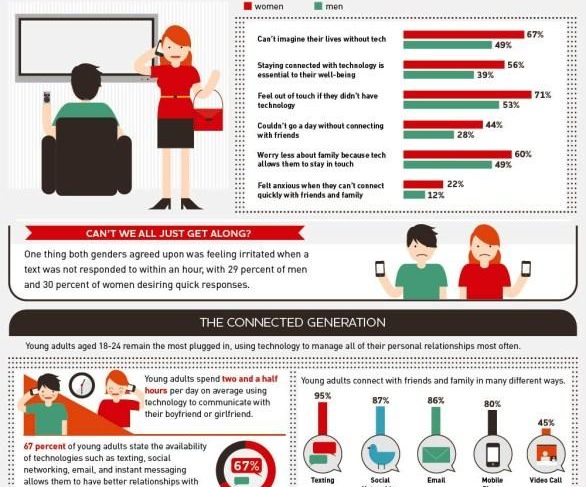
TORONTO – Having access to email, text and iPhone’s personal assistant Siri have become more important for a majority of Canadians than even their connections to family and friends reveals new research by Rogers Communications.
The latest Rogers Innovation Report focuses on how technology users connect to family and friends and includes a survey that indicates almost six out of ten (58%) Canadians cannot imagine life without the modern conveniences of texting, email and social networking. In stark contrast, only 44% of women and 22% of men surveyed indicated that they couldn’t go a day without connecting with friends (see infographic below).
Rogers contends though that the impact of technology on relationships and families is for the better. "There's no question that technology is transforming our lives. Canadians tell us that with all the communication options that technology now provides, it's making their lives easier and relationships better," said Robert Switzman, Rogers Senior Director, Convergence. "From making plans for dinner to checking in with the kids, staying connected to their loved ones is a top priority for Canadians."
But it appears that staying “connected” with family is increasingly via a smartphone, as opposed to actually being in the same room together.
The online survey was conducted last month among 1,403 randomly selected adult Canadians that own a smartphone or tablet and use texting, social networking, video calling, email, instant messaging, or BBM. Among other findings, the report reveals that women have a much stronger tendency than men to use technology as a tool for keeping close to those they care about. And while young adults continue to rely heavily on newer technologies like texting to connect with friends and family, they “still recognize situations when a traditional phone call is the way to go.”
Women vs. men
In its media release Rogers also focuses on the “battle of the sexes.” It finds that women, significantly more than men, felt strongly about the use of technology to manage relationships with their friends, families and partners. Rogers says it helps them to “avoid anxiety and positively benefits their overall lives.” The survey also found that six-in-ten women (60%) “no longer worry about their family” because technology allows them to stay in touch when and where they need to, compared to 49% of men. Almost twice as many women as men felt anxious when they can't connect quickly with friends and family (22% women vs. 12% men).
Two-thirds of women (67%) cannot imagine their lives without technology as opposed to 49% of men. Fifty-six percent of women feel that staying connected with technology is essential to their well-being, while only 39% of men felt the same. Seven-in-ten women (71%) would feel out of touch if they didn't have technology vs. 53% of men. Forty-four per cent of women say it's nearly impossible to go a day without connecting with friends compared to 28% of men.
Talking with my generation
Young adults aged 18-24 according to Rogers are the most plugged-in, using technology with the highest frequency to manage all of their personal relationships. That demo spends two-and-a-half hours per day on average communicating with their boyfriend or girlfriend. They also connect with family and friends in many different ways. Texting is the most commonly used tool at 95%, while 87% use social networking applications; 86% use email; 80% place a phone call with their mobile device; and 45% place a video call. How much this has displaced actual face-to-face conversations is not indicated by the study.
Two-thirds of young adults (67%) state the availability of such technologies as texting, social networking, email and instant messaging allows them to have “better relationships with their friends, partners and family.”
Rogers says that young adults know that it is best to make it “more personal” with their parents: placing a call by cell or home phone is the still most used method (88%), followed by texting (58%) and email (56%). When it comes to asking their parents for money, young adults feel it is appropriate to ask over the phone (57%), but they also feel other methods are appropriate; 15% feel asking via email is acceptable; 14% are okay doing this by video calling; and 10% think asking via text is fine.
Lastly, both genders agreed feeling irritated when a text was not responded to within an hour, with 29% of men and 30% of women desiring quick responses. So remember, if you are spending some quality time with friends or family and receive a text message, it’s best to drop everything and respond immediately or risk irritating someone… 😉



